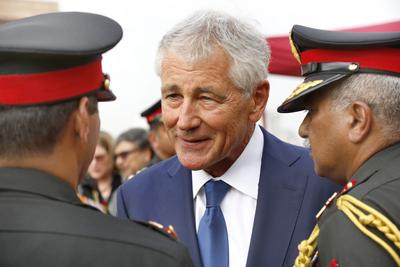These two visits have given much-needed political traction to the troubled India–US relationship. Over the last year, the list of disappointments and frustration has been long and varied including: the December 2013 Devyani Khobragade controversy (where the Indian diplomat in New York was arrested for alleged visa fraud, strip-searched and returned to India), unease over Prime Minister Modi having been denied a visa to the US when he was Chief Minister of Gujarat, and Indian dismay over US snooping related to the Snowden revelations. This dissonance resulted in US Ambassador Nancy Powell choosing to step down before the end of her tenure.
The Obama administration conveyed its intent to engage with Prime Minister Modi soon after his dramatic victory in May and the visa issue was deftly set aside by the Indian leader who signalled his intent to pursue the relationship in an objective manner devoid of any personal grievances about the past. Testing the resilience of the relationship was the Indian decision to reject the global trade facilitation agreement on the eve of the Kerry visit with both sides prudently agreeing to disagree.
To that extent the visits by Kerry and Hagel have enabled both sides to identify some of the big issues that will form the agenda for the Modi–Obama meeting scheduled for late September in Washington. The US and India have had an estranged relationship for three decades over the nuclear issue and in 2005 then president Bush took the radical decision to review and re-arrange the bilateral relationship. Deftly squaring the nuclear circle, the June 2005 Bush–Manmohan Singh civilian nuclear cooperation agreement accorded India an exceptional status in the global nuclear community and redressed the US-led ostracism imposed on India in 1974.
But, for the US, India is neither fish nor fowl in more ways than one and the ambivalence continues. Delhi’s adherence to a non-aligned posture during the Cold War decades and the resultant empathy with Moscow was in contrast to the US–China rapprochement in the latter phase of the Cold War. After the disintegration of the former USSR, and the strategic flux that followed, India embarked on its long delayed economic liberalisation program and the May 1998 nuclear tests burnished Indian credibility as a major power.
Opting to forge partnerships as opposed to any formal military alliance, Delhi managed to engage its critical negotiators and invested in fora such as the BRICS (Brazil, Russia, India, China and South Africa), supporting the concept of a multi-polar global system.
The improvement in relations with both China (from 1993) and the USA (from 2005) has been a significant achievement for Indian diplomacy and currently Delhi is in an enviable situation wherein its progress is welcomed and encouraged — unlike the rise of China which causes unease across the region.
India’s status as a significant swing state in the emerging strategic framework is acknowledged by its peers and this is reflected in the manner in which the Modi government is perceived by capitals across the world. Whether Prime Minister Modi will be able to manage concurrent relationships with adversarial powers is moot. Some dyads such as US–Russia, US–China and China–Japan are particularly complex and the dynamic of global trade and commerce does not allow for any binary choices.
The US also faces this dilemma, and the Kerry and Hagel visits come at a time of strategic importance. Though it has received little attention, India (at Russia’s behest) is set to join the China-led Shanghai Cooperation Organization (SCO) in early September, along with Iran, Pakistan and Mongolia. This is a security forum whose ‘non-western’ identity cannot be ignored and though it is focused on terrorism and extremism, its strategic contour, when expanded, will include four nuclear weapon powers (Russia, China, India and Pakistan ) and one aspirant — Iran.
India’s SCO membership is likely to be formalised by mid-September before Prime Minister Modi is scheduled to visit Washington. How will the US deal with this new aspect of Indian identity? While Delhi has been committed to its notion of ‘strategic autonomy’ and does not wish to ‘take sides’, the awkward reality is that it is heavily dependent on imports for its military inventory.
India’s quest to acquire some degree of credible indigenous military capability is inexorably linked to how it defines its relations with the US. The Kerry and Hagel visits only point to the complex and contradictory agenda that will subsume the Obama–Modi meeting.
C Uday Bhaskar is Distinguished Fellow at the Society for Policy Studies, New Delhi.

